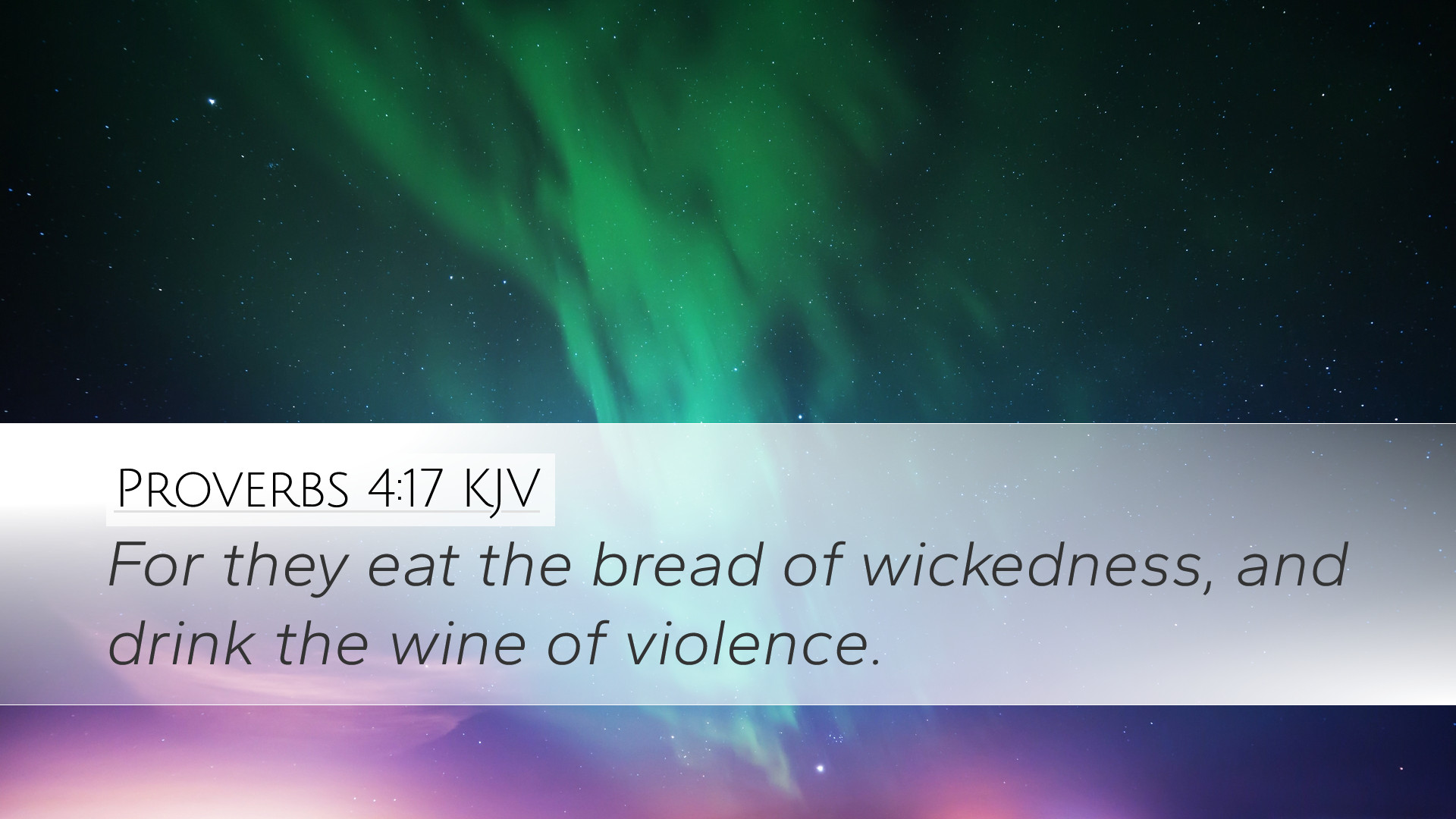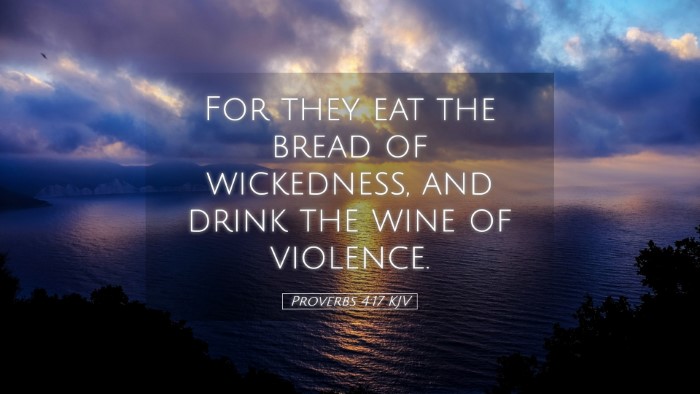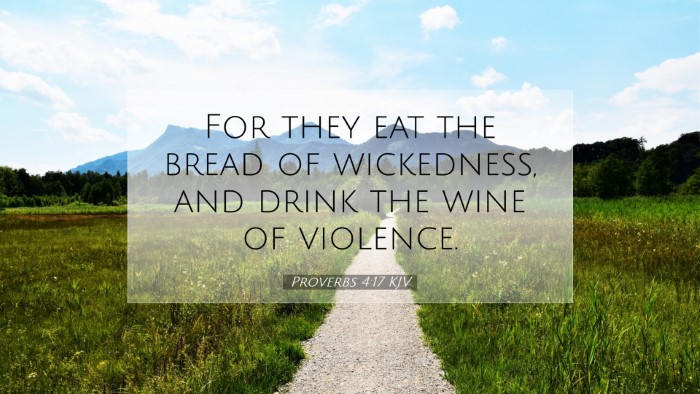Commentary on Proverbs 4:17
“For they eat the bread of wickedness, and drink the wine of violence.”
Overview
Proverbs 4:17 serves as a warning against the destructive path of the wicked. The imagery of consumption—eating and drinking—indicates that they not only partake in evil acts but also derive nourishment from them, suggesting a deep-rooted engagement with wickedness and violence. This verse underscores the necessity for wisdom and discernment in the choices one makes regarding moral and ethical conduct.
Insights from Matthew Henry
Matthew Henry emphasizes the metaphorical nature of the verse. He notes that eating the “bread of wickedness” symbolizes the sustenance derived from sinful acts, highlighting that wickedness provides temporary satisfaction but ultimately leads to spiritual death. His commentary outlines the consequences of such lifestyle choices, encouraging readers to consider the long-term effects associated with embracing evil.
Henry further elaborates that the phrase “drink the wine of violence” implies indulgence in brutalities and immoral actions that go beyond mere wrongdoing. He suggests that violence here is not just physical but can also manifest in emotional or spiritual harm toward others. The focus is on the broader destructive potential of a life entrenched in wickedness, illustrating how one’s actions can spiral out of control.
Insights from Albert Barnes
Albert Barnes brings an analytical approach, suggesting that the verse communicates a clear demarcation between the paths of the wicked versus the righteous. He articulates that the terms “bread” and “wine” function as central elements necessary for life and enjoyment but, in this context, they denote sustenance derived from evil. Barnes emphasizes that those who live in wickedness will find their provisions come through violence and deceit, ultimately leading to ruin.
Barnes continues by considering the cultural implications of eating and drinking. He notes that these activities are typically associated with fellowship and community; thus, partaking in such vices indicates a communion not just with evil but also within a communal context that promotes immorality. He warns readers to assess their associations and practices, as they shape one's moral compass.
Insights from Adam Clarke
Adam Clarke expands upon the theme of moral pollution that comes from engaging in violence and wickedness. He notes that the phrase “eat the bread of wickedness” signifies appropriating the wealth obtained through dishonest means. Clarke points out that the temporality of such bread is a key consideration; it may satisfy momentarily but leaves the soul famished and desolate.
Regarding the “wine of violence,” Clarke elucidates that wine often signifies joy and blessing in biblical texts. Here, however, it inverts that meaning, illustrating how violence corrupts what should be uplifting. He acknowledges that this verse alludes to the broader patterns of life choices made by individuals, advocating for a deliberate pursuit of wisdom which would lead one away from such self-destructive consumption.
Theological Implications
From a theological perspective, Proverbs 4:17 serves as a microcosm of the larger battle between good and evil present throughout scripture. The evident contrast between divine wisdom and human folly is pronounced, calling believers to reflect on their spiritual diets. It compels theologians and students of the Word to grapple with the issues of morality tied to the broader narrative of redemption.
The verse also correlates with New Testament themes of transformation and renewal. Just as Jesus calls for believers to partake in His body and blood, symbolizing life and grace, so too must individuals consciously choose what sustenance will nourish their spirits. The theological currents within this verse propel individuals toward seeking righteousness, adhering to a lifestyle that bears lasting fruit in the Kingdom of God.
Practical Applications
- Reflection: Believers should regularly assess their life choices, considering the sources of their 'nourishment'—whether they be righteous or wicked.
- Community Engagement: In choosing to associate with others, discernment is crucial. One's fellowship can heavily influence the path one walks.
- Moral Education: Pastors and educators should emphasize the importance of wisdom literature in shaping the moral consciousness of their congregations.
- Spiritual Vigilance: The call to a life of wisdom necessitates ongoing vigilance against complacency in the face of societal norms that may valorize wickedness.
Conclusion
Proverbs 4:17 is a sobering reminder of the consequences of one's choices in the pursuit of sustenance for the soul. Through the insights of noted commentators such as Henry, Barnes, and Clarke, this verse resonates with the timeless realities of the human condition and the beckoning of divine wisdom. It challenges pastors, students, theologians, and scholars alike to foster a heart and mind that seeks after righteousness, understanding that true nourishment lies not in wickedness or violence, but in the life-giving presence of God.


